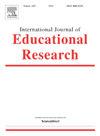在全球大流行期间和之后利用无线电交流信息以支持学习:乌干达农村的积极偏差研究
IF 2.5
3区 教育学
Q1 EDUCATION & EDUCATIONAL RESEARCH
引用次数: 0
摘要
本文考察了在大流行期间在乌干达东部农村进行的第一次积极偏差(PD)研究的影响。利益攸关方之间的积极互动和信息共享被认为是一种高影响力的学校做法,在乌干达东部农村大流行之前,这些学校的表现优于处境不利地区的其他学校。我们在大流行期间通过广播谈话节目实施了这种PD实践,并检查了其在儿童、家庭和学校层面的影响。结果显示,这对儿童的表现、学生的保留率、在家学习时间的增加以及在学校持续的混合式学习都有积极的影响。广播谈话节目对女户主和男户主家庭的影响有显著差异。在成绩方面的性别差异、缺乏学校一级的举措以及大流行病后提供私人辅导的公平性方面也存在一些挑战。进一步的研究将有必要澄清家长、教师和社区成员如何更有效地分享信息,因为与之前的研究不同,短信对大多数家长来说并没有起到激励学习的作用。本文章由计算机程序翻译,如有差异,请以英文原文为准。

Use of radio to share information for supporting learning during and after a global pandemic: A positive deviance study in rural Uganda
This article examines the impact of the first Positive Deviance (PD) study in rural Eastern Uganda conducted during the pandemic. The active interaction and information sharing among stakeholders had been found as a high-impact practice of schools that performed well over other schools in the disadvantaged areas before the pandemic in rural eastern Uganda. We implemented such PD practice through radio talk shows during the pandemic and examined its impact at child, household, and school-levels. The results showed a positive impact on children's performance, retention of pupils, increased learning time at home, and continuous blended learning at school. There was a significant difference in the effect of the radio talk shows on female-headed and male-headed households. Some challenges were also found in gender differences in performance, the lack of school-level initiatives, and equity in provision of private coaching after the pandemic. A further study will be necessary to clarify how parents, teachers, and community members share information more effectively, as the SMS did not work for most parents as an incentive for learning unlike the previous study.
求助全文
通过发布文献求助,成功后即可免费获取论文全文。
去求助
来源期刊

International Journal of Educational Research
EDUCATION & EDUCATIONAL RESEARCH-
CiteScore
6.20
自引率
3.10%
发文量
141
审稿时长
21 days
期刊介绍:
The International Journal of Educational Research publishes regular papers and special issues on specific topics of interest to international audiences of educational researchers. Examples of recent Special Issues published in the journal illustrate the breadth of topics that have be included in the journal: Students Perspectives on Learning Environments, Social, Motivational and Emotional Aspects of Learning Disabilities, Epistemological Beliefs and Domain, Analyzing Mathematics Classroom Cultures and Practices, and Music Education: A site for collaborative creativity.
 求助内容:
求助内容: 应助结果提醒方式:
应助结果提醒方式:


